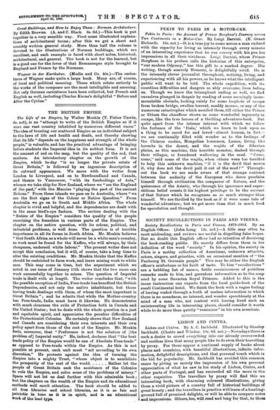PEKIN TO PARIS IN A MOTORCAR.
Pekin to Paris : the Account of Prince Borghese's Journey across Two Continents in a Motor-Car. By Luigi Bimini. (E. Grant Richards. 16s. net.)—It is a true joy to come across a man endued with the capacity for living so intensely through every minute of an interesting experience that he can convey with his pen hie impressions in all their vividness. Luigi Barzini, whom Prince Borghese in his preface calls the historian of this enterprise, "our modern Odyssey," has this gift to a marked degree. His. writing, though scarcely Homeric, is delightfully vivid. He is the intensely clever journalist throughout, noticing, living, and experiencing with all his powers, as he knows what the intelligent public will want to be told. The whole expedition, with its countless difficulties and dangers so ably overcome, lives before us. Though we know the triumphant ending so well, we find ourselves plunged in despair by reading of some seemingly insur- mountable obstacle, looking vainly for some loophole of escape from broken bridge, swollen torrent, muddy morass, or any of the numerous catastrophes which assailed them, till either the Prince or Ettore the chauffeur shows us some wonderful ingenuity in escape, like the true heroes of a thrilling adventure-book. But quite apart from the intense interest with which we follow the fortunes of the Italie' which we learn to look upon as a thing to be cared for and loved—almost human, in fact— we are continually filled with wonder as to the feelings of the Chinese coolies, Mongolian horsemen, Lamas, living like hermits in the desert, and the mujiks of the Siberian plains, as this machine, this horrible monster, dashed through their villages, or foundered wallowing in the mud. "Come. come," said some of the mujiks, when others were too terrified to help this unknown machine, "if it is the devil that moves it, why does not the devil pull it out of the mud P" Through- out the book we are made aware of that strange contrast between the audacity of the European who dares proclaim himself through civilisation the conqueror of Nature, and the quiescence of the Asiatic, who through his ignorance and super- stitious belief counts it his highest privilege to be the servant of that Nature which he recognises as so much stronger than himself. We are thrilled by the book as if it were some tale of wonderful adventure ; but we get more than that in much food for speculation and thought.






















































 Previous page
Previous page